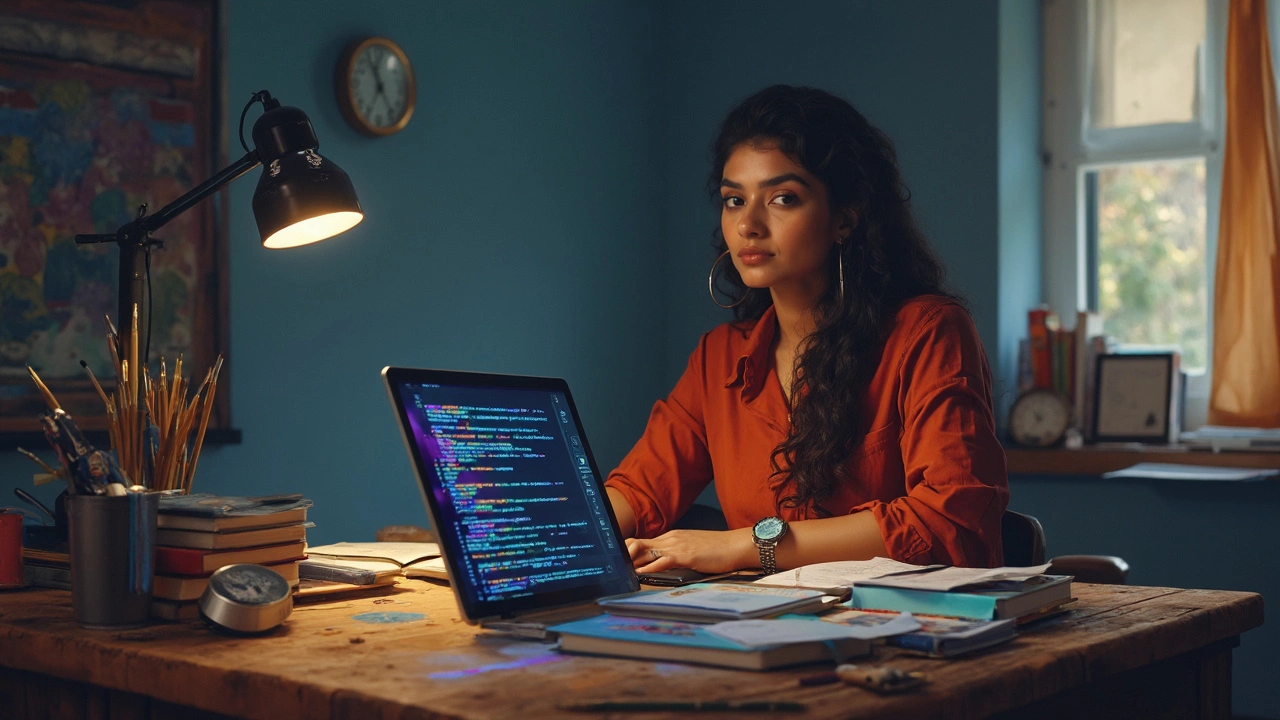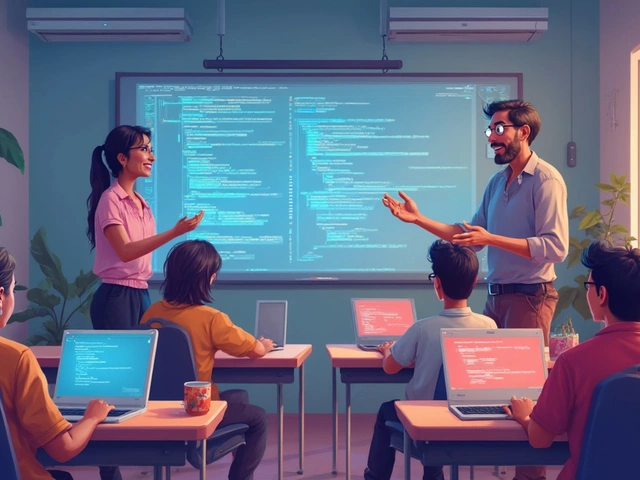
Ever dreamt of learning to code in just three months? That's a pretty exciting challenge but not as wild as it might seem at first. With the right plan, you can definitely get the hang of coding basics within this timeframe. But here's the deal—you’ve got to be realistic about what 'learning to code' means. In three months, you're not aiming to become a full-fledged developer but rather to get comfortable enough to build simple projects, maybe even impress your friends with a funky little app!
The first step is setting clear, manageable goals. You don't climb Everest without a plan, right? Same goes for coding. Choose a language that suits your interests or career goals. Languages like Python and JavaScript are popular starting points because they’re easy to understand and super versatile. Plus, there's a ton of resources out there, so you're never short of help.
- Setting Realistic Goals
- Choosing the Right Language
- Effective Learning Strategies
- Staying Motivated and Consistent
Setting Realistic Goals
When you're trying to learn coding in three months, setting realistic goals is crucial. Think of it like a game level: you don’t want it too easy, or you'll get bored; too hard, and you might just give up. The same goes for coding. Start by thinking about what you really want to achieve. Do you want to build your own website? Maybe create a small game?
Let's break it down. Three months is about 12 weeks. If you dedicate a few hours each day, you connect the dots faster. Start by picking a project that genuinely excites you. This keeps motivation high and gives you a tangible goal to work toward. Remember, it’s more about quality learning—grasping concepts well—than rushing through material.
Mapping your progress is another key part of setting these realistic goals. Here’s a handy checklist to help you know what to aim for:
- Week 1-4: Get comfy with the basics of your chosen programming language. Build straightforward programs like a calculator or a to-do list app.
- Week 5-8: Start working on more complex concepts such as functions, loops, and data structures. Try integrating APIs or create a web page with forms.
- Week 9-12: Focus on a project that combines what you’ve learned. Whether it’s a simple game or a dynamic website, it's your chance to apply everything practically.
Remember to keep a balance between learning and practicing—coding is best learned by doing. Mixing theory with practice helps the concepts stick. Adjust your goals as you go along; if something is too tough, break it into smaller, more achievable tasks. Progress is not a straight line, and it's totally okay to recalibrate your pace.
| Task | Expected Time |
|---|---|
| Basics | 1 month |
| Intermediary Projects | 1 month |
| Advanced Project | 1 month |
Choosing the Right Language
Diving into coding doesn't mean you should start with the toughest language out there. Think of it like learning to swim—you don't jump straight into the deep end. Picking the right programming language is all about your goals and interests. If you're not sure where to start, here's a rundown that might help you make up your mind.
First off, let's talk about Python. It's like the friendly neighbor in the coding universe. Python is known for its readability and simplicity, making it a top choice for beginners who want to learn to code fast. Many tech giants like Google and Facebook have Python embedded in their tech stacks, so learning it opens up tons of opportunities.
Then there's JavaScript, the go-to for web development. If you're into making cool websites or want to dive into front-end work, this is the language for you. JavaScript is everywhere on the web, and mastering it gives you a solid base to build all sorts of interactive content.
If you're more interested in mobile apps, try Swift for iOS development or Kotlin for Android. These are slightly more niche compared to Python and JavaScript but are incredibly useful if mobile is your thing.
For those curious about getting into data science or machine learning, Python wins again, hands down. Its extensive libraries make it perfect for crunching numbers and analyzing data.
Now, let's not forget about Java. It’s been around a while and is known for being robust and versatile. Java is used in Android app development and big enterprise systems, making it a strong choice for those looking to get into these fields.
Ultimately, picking the right language is about what gets you excited. Once you find one that sparks your interest, you're more likely to stay motivated and keep at it. Remember, every coder started somewhere, and choosing the right language is your first step in this exciting journey.

Effective Learning Strategies
Diving into coding can feel kind of overwhelming at first, like trying to solve a puzzle with all the pieces scattered around. But by using clever strategies, the chaos can transform into an exciting learning journey. Let's unpack some tried-and-true methods that'll help you get a grip on coding efficiently.
First up, break down your learning into small, manageable chunks. Jumping straight into a huge project isn't the smartest move. Instead, tackle bite-sized challenges and lessons. This way, you continually build your skills without feeling burnt out.
Engaging in active learning is crucial. Rather than passively reading or watching tutorials, dive into hands-on projects. Start with simple scripts or basic web pages if you're into HTML and JavaScript. By actually writing code, you're reinforcing concepts faster and developing muscle memory for coding syntax.
Here's a nifty little trick—use spaced repetition. It’s like revisiting what you've learned at calculated intervals to help beat the forgetfulness curve. Platforms like Anki use this concept brilliantly to reinforce what you’ve learned.
Don't overlook the power of coding communities. Platforms like Stack Overflow or GitHub aren’t just places for expert programmers. These are bustling hubs of beginner questions, solutions, and discussions. If you're stuck, odds are someone else has been in your shoes before.
- Plan regular coding sessions: Consistency beats cramming.
- Pair learning with projects: Apply what you learn practically.
- Utilize online resources: Platforms like Codecademy, freeCodeCamp, or Coursera have structured courses.
- Keep practice fun: Contribute to open-source projects or hackathons for real-world experience.
If stats are your thing, know that folks learning with structured guidance can grasp functional programming principles in about 60 hours over a few weeks. That's less than you'd spend binge-watching a new series!
Remember, everyone learns differently, so feel free to tweak these strategies to fit how you work best. Happy coding!
Staying Motivated and Consistent
Keeping your excitement high and your efforts steady is crucial when you're trying to learn coding fast. It's easy to start with a bang and fizzle out, but maintaining momentum is key. Think of it like running a marathon; pacing yourself is everything.
First up, create a schedule that works for you. Whether it’s an hour a day or longer sessions every weekend, consistency beats intensity. It might help to use a calendar app or a planner to track your coding sessions. Trust me, seeing those blocks of time all lined up can be crazy motivating!
Find a community or group of people who are on the same path. Loads of online forums and groups are dedicated to newbies in coding classes. Join these spaces to share experiences, ask questions, and get support. It's comforting to know others are facing the same hurdles.
Mix up your learning methods to keep things interesting. Sure, tutorials and coding challenges are great, but don’t shy away from videos, podcasts, or even games designed to improve coding skills. Variety keeps your brain engaged and prevents burnout.
Reward yourself for hitting milestones, big or small. Whether it’s completing a coding challenge or finally making that pesky code work, give yourself a pat on the back. Celebrate these moments because they're proof of your progress.
If you’re curious about how people stay on track, here's a quick glimpse:
| Student | Hours per Week | Motivation Tips |
|---|---|---|
| Maya | 10 | Uses a rewards system |
| Ethan | 15 | Part of an online coding group |
| Sophia | 20 | Varies learning methods |
Remember, progress is still progress. Even if some days seem tough, know that each step brings you closer to your coding goal. Hang in there and keep at it—you're doing great!
More Articles

Top-Paying Certifications: Unlock Your Next Big Salary Jump
Considering an online certification? It's crucial to know which ones offer the best return on investment. Some certifications not only boost your skills but can significantly increase your earnings too. This article delves into the certifications that pay the most, offering insights into fields with high demand and lucrative salaries. Armed with the right information, you'll be better equipped to make an informed decision about your education path.

What Makes a Good Digital Platform for E-Learning?
Not all e-learning platforms are made equal, and some just make studying a chore. This article breaks down the qualities that make a digital platform effective and enjoyable for both students and teachers. Think user-friendly design, solid content delivery, and little touches that actually help people learn better. Along the way, you’ll find out what seasoned users really want and need—plus, get actionable tips on how to spot a platform that won’t leave you frustrated. Time to make digital learning feel a lot smarter, simpler, and more human.

Understanding the Key Differences Between Coding and Programming
Ever wondered what makes coding different from programming? Dive into this article to understand how coding is the specific act of writing a script in a friendly language for computers, while programming encompasses a broader scope. With interesting facts and practical tips, you'll grasp the nuances between these terms often used interchangeably. Discover how coding forms a subset of programming and what skills are essential for each. Get ready to enhance your knowledge if you're stepping into the tech field!
